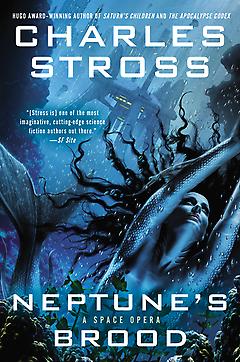Neptune’s Brood, the latest science fiction novel from multiple award winner Charles Stross, could be subtitled a novel of adventure and accountancy. I’ve read what seems to me a lot of fiction, and a lot of science fiction: I don’t think I’ve ever before read a novel so closely involved with financial theory and the workings of money and debt. Stross has written a novel that works as both science fiction thriller and an exploration of how interstellar banking—interstellar economics—could work in a universe without FTL travel but with interstellar mobility.
Neptune’s Brood takes place in the far future of a universe first introduced in Saturn’s Children, a universe where the original human species has gone extinct and where our more robust post-human descendants have spread out to colonise the stars. Krina Alizond-114 is a historian of accountancy practices, with a special interest in the fraud known as the “FTL scam.” On a lengthy academic pilgrimage to meet colleagues and share the fruits of her research, she discovers her sister and colleague, Ana Graulle-90, has moved to the water-world of Shin-Tethys and from there, disappeared. Krina sets out to find her. Her dangerous journey across the deeps of interplanetary space is complicated by internal dissent on board the Church of the Fragile ship on which she’s taken passage, by the privateers-slash-life insurance underwriters interested in her sister’s life insurance policy, and by the assassin on her trail.
And by her growing realisation that both the trouble following her and her sister’s disappearance are linked to a two-thousand-year-old scam, the largest FTL scam in the known universe. A piece of murderous financial skulduggery whose fruits saw Krina’s lineage matriarch, the coldly political Sondra Alizond, acquire tremendous wealth and influence which she’s maintained to the present day—and Krina is carrying around valuable evidence concerning it. Evidence which, if matched with the other half of a long-ago transaction, is worth more money than most sentients ever dream of.
No, seriously. A lot of money.
More money than that.
In the waters of Shin-Tethys and in space around it, secrets are revealed, families are faced down, and climactic battles occur. And I don’t want to spoil the reveal.
But I will, so be warned.
Charles Stross, as befits a writer with his track record, builds a shiny, internally-consistent SFnal future. Krina’s first-person retrospective narration, sharp and with a hint of dry academic rigour, interspersed with scenes from the perspective of others in an “If I had known at the time” style, whips along at a lively, engaging rate, its pace and tension building as it goes.
But all the pace and tension in the world mean very little without appropriate payoff. And Neptune’s Brood doesn’t stick its dismount. For, you see, after laying out more than one way the greatest FTL scam in history could have gone down, Stross reveals that the scam… wasn’t what it appeared to be. And the FTL scam turned out not to be a scam at all, precisely. Not FTL travel, no. But something almost as useful. All this is revealed in the final run-up to a climactic confrontation between Krina and her progenitor, and revealed in ways that seem rather too easy, considering the amount of bait-and-switch that’s been going on until now. It doesn’t feel earned. I like my climactic reveals to feel more natural than that.
As for the confrontation itself… it’s rather a let-down. The novel as a whole ends abruptly, with little denouement to follow the climax. Indeed, the thriller-climax of the book is wholly out of sync with the emotional climax, which comes between Krina and her sister a chunk of time earlier. And while Krina’s voice is strong, few of the novel’s other characters come across as well-rounded entities with understandable goals. Those are off-putting flaws in a novel, made more so by the abrupt finish.
I enjoyed Neptune’s Brood, don’t get me wrong: it’s slick, full of interesting SFnal possibilities, and no slighter or more info-dumpy than any number of other thrillers. But Stross at the top of his game can do better than this. Judged against those high standards, Neptune’s Brood leaves me disappointed.
By any other standards, it’s still rather good.
Neptune’s Brood is available now from Ace Hardcover.
Liz Bourke needs to read faster. Her blog. Her twitter.











From comments elsewhere i’m intrigued that it sounds like it’s basically ‘debt: the next 5000 years’ which is no bad thing having read david graeber’s seminal work. It might very well be worth reading that as a prelude to this i think, as well as saturn’s children of course.
@1) He actually uses a quote from ‘Debt’ as the frontspiece. And it has very little in common with Saturn’s Children. Other than knowing all the characters are robots (so to speak), little else is needed from the first book…and he covers that in the narrative as well.
Maybe not much in common but it’s set in the same universe and personally i couldn’t read this without reading the first one. Plus i was of the assumption there are descendants of freya but *spoilers* since i’ve yet to start it.
It may be set ell beyond the story told in the first book but it draws heavily upon that book. I’d advise reading Saturn’s Children first. And I do hope that it’s more interesting than the Saturn’s Children which was badly written as Heinlein’s Friday.
“I don’t think I’ve ever before read a novel so closely involved with financial theory and the workings of money and debt.”
You guys are reading it right now: “The Folding Knife”
Looking back, I have to say that I agree, and that the payoff could have worked better, but as you say, it’s still a Stross, and therefore a damn good read.
Speaking of economics and SF:

This would have been a fun table–from left to right:
Paul Krugman, Laurie Penny, Tony Cunningham, Ken MacLeod, Andrew J. Wilson, Charlie Stross.
From Paul Krugman’s blog:
krugman.blogs.nytimes.com/2013/07/20/single-malts-and-science-fiction/